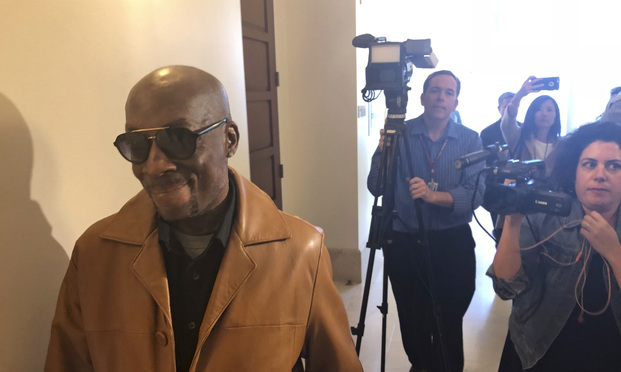California Appeals Court Hears Arguments on First Roundup Verdict
In the first oral arguments over a Roundup verdict, a California appeals court raised numerous questions about Monsanto's defense of federal preemption but appeared hesitant to retain the $39 million in compensatory damages within the $289 million jury award.
June 02, 2020 at 04:17 PM
5 minute read
 Plaintiff DeWayne Johnson, a school groundskeeper who says Roundup weed killer caused his cancer, leaves a courtroom in San Francisco. AP Photo: Paul Elias, File
Plaintiff DeWayne Johnson, a school groundskeeper who says Roundup weed killer caused his cancer, leaves a courtroom in San Francisco. AP Photo: Paul Elias, File
A California appeals court reviewing a $289 million Roundup verdict raised numerous questions about federal preemption but appeared hesitant to retain the $39 million in compensatory damages.
In arguments Tuesday, a panel of the First District Court of Appeal probed lawyers on whether federal preemption could apply to claims of both failure to warn and design defect, particularly in light of the U.S. Supreme Court's 2005 holding in Bates v. Dow Agrosciences.
"One of my first questions for you is regarding preemption," Administrative Presiding Justice Jim Humes told Monsanto attorney David Axelrad, of Horvitz & Levy in Los Angeles. "Does it matter whether or not the failure to warn claims are preempted in light of Bates, which seems to suggest the design defect claim is not preempted?"
Arguments also focused on the damages, which San Francisco Superior Court Judge Suzanne Bolanos reduced to $78 million based on a 1:1 ratio of compensatory to punitive damages. The panel asked whether the plaintiff, Dewayne Johnson, who was 43 when he was diagnosed in 2014, was entitled to $33 million in future noneconomic damages based on a projected life span of 33 more years when there was testimony he would only live another 1.5 years.
"The argument was it would be a miracle for Mr. Johnson to live very long," said Associate Justice Gabriel Sanchez. "And it seems a little bit odd, and for us to allow an award of future noneconomic damages supported by it would require a miracle to happen."
The arguments are the first in an appeal of a verdict over Roundup, alleged in thousands of lawsuits to cause non-Hodgkin lymphoma. Other juries in California awarded $80 million and $2 billion last year, and Monsanto has appealed those verdicts to the U.S. Court of Appeals for the Ninth Circuit and the First District Court of Appeal.
Tuesday's appellate arguments also come as Bayer, which owns Monsanto, is in negotiations to settle up to 85,000 of the lawsuits for $10 billion.
Johnson, who won the $289 million verdict, claimed he got non-Hodgkin lymphoma after spraying Roundup as a school groundskeeper. Much of the trial revolved around the scientific evidence and opinions of regulators on whether a key ingredient in Roundup, glyphosate, caused non-Hodgkin lymphoma.
The appellate arguments, however, focused on Monsanto's defense, raised in all three appeals, that the position of the U.S. Environmental Protection Agency, which has insisted that Roundup does not require a cancer warning on its label, and the FIFRA, or Federal Insecticide, Fungicide, and Rodenticide Act, preempted Johnson's state law claims. Earlier this year, the appeals court sought supplemental briefs on federal preemption, in light of a 2019 affirmation from the EPA and the U.S. Supreme Court's preemption decisions in two cases involving pharmaceutical drugs, Wyeth v. Levine in 2009 and Merck Sharp & Dohme v. Albrecht in 2019.
On Tuesday, the panel also appeared to punt on the idea that it should decide preemption based on Wyeth or Merck, given the trial judge did not hear arguments on Merck. The questions specifically focused on whether FIFRA preempts Johnson's failure-to-warn causes of action, but not his design defect claim, and, if so, what impact that could have on the jury's award.
Axelrad insisted both intertwined, because both focused on the Roundup label. But Humes was skeptical.
"It's not clear to me that in this case the only issue related to the design defect claim is an issuing of labeling," he told Axelrad.
Sanchez also raised additional questions about the jury's finding that Monsanto failed to warn. When Axelrad insisted that there was "unanimous consent" among regulatory agencies at the time of Johnson's diagnosis that glyphosate was not carcinogenic, Sanchez responded, "I don't think I'd agree with you it was unanimous consensus."
Miller noted that Monsanto ghostwrote many of the articles on which regulators relied.
The panel also expanded on a question posed last month to lawyers that, should it reduce future noneconomic damages, as Monsanto argued, should it also reduce the punitive damages to maintain the 1:1 ratio?
Miller, who noted that Johnson is still alive, argued that the ratio should be closer to 4:1, not 1:1.
"At a minimum, Johnson would be entitled to 4:1, but Johnson's should be higher because Johnson is younger, Johnson is dying," Miller said. "He was scared to death about his cancer. He twice called Monsanto, and they wouldn't take his call. Nothing could be more reprehensible than that."
This content has been archived. It is available through our partners, LexisNexis® and Bloomberg Law.
To view this content, please continue to their sites.
Not a Lexis Subscriber?
Subscribe Now
Not a Bloomberg Law Subscriber?
Subscribe Now
NOT FOR REPRINT
© 2025 ALM Global, LLC, All Rights Reserved. Request academic re-use from www.copyright.com. All other uses, submit a request to [email protected]. For more information visit Asset & Logo Licensing.
You Might Like
View All
Devin Nunes, Former California GOP Congressman, Loses Move to Revive Defamation Suit
6 minute read
'Close Our Borders?' Senate Judiciary Committee Examines Economics, Legal Predicate for Mass Deportation Proposal
3 minute read
A Judge Asks: Is It Time to End Ken Feinberg's Roundup Settlement Program?
7 minute read
Law Firms Mentioned
Trending Stories
- 1Uber Files RICO Suit Against Plaintiff-Side Firms Alleging Fraudulent Injury Claims
- 2The Law Firm Disrupted: Scrutinizing the Elephant More Than the Mouse
- 3Inherent Diminished Value Damages Unavailable to 3rd-Party Claimants, Court Says
- 4Pa. Defense Firm Sued by Client Over Ex-Eagles Player's $43.5M Med Mal Win
- 5Losses Mount at Morris Manning, but Departing Ex-Chair Stays Bullish About His Old Firm's Future
Who Got The Work
J. Brugh Lower of Gibbons has entered an appearance for industrial equipment supplier Devco Corporation in a pending trademark infringement lawsuit. The suit, accusing the defendant of selling knock-off Graco products, was filed Dec. 18 in New Jersey District Court by Rivkin Radler on behalf of Graco Inc. and Graco Minnesota. The case, assigned to U.S. District Judge Zahid N. Quraishi, is 3:24-cv-11294, Graco Inc. et al v. Devco Corporation.
Who Got The Work
Rebecca Maller-Stein and Kent A. Yalowitz of Arnold & Porter Kaye Scholer have entered their appearances for Hanaco Venture Capital and its executives, Lior Prosor and David Frankel, in a pending securities lawsuit. The action, filed on Dec. 24 in New York Southern District Court by Zell, Aron & Co. on behalf of Goldeneye Advisors, accuses the defendants of negligently and fraudulently managing the plaintiff's $1 million investment. The case, assigned to U.S. District Judge Vernon S. Broderick, is 1:24-cv-09918, Goldeneye Advisors, LLC v. Hanaco Venture Capital, Ltd. et al.
Who Got The Work
Attorneys from A&O Shearman has stepped in as defense counsel for Toronto-Dominion Bank and other defendants in a pending securities class action. The suit, filed Dec. 11 in New York Southern District Court by Bleichmar Fonti & Auld, accuses the defendants of concealing the bank's 'pervasive' deficiencies in regards to its compliance with the Bank Secrecy Act and the quality of its anti-money laundering controls. The case, assigned to U.S. District Judge Arun Subramanian, is 1:24-cv-09445, Gonzalez v. The Toronto-Dominion Bank et al.
Who Got The Work
Crown Castle International, a Pennsylvania company providing shared communications infrastructure, has turned to Luke D. Wolf of Gordon Rees Scully Mansukhani to fend off a pending breach-of-contract lawsuit. The court action, filed Nov. 25 in Michigan Eastern District Court by Hooper Hathaway PC on behalf of The Town Residences LLC, accuses Crown Castle of failing to transfer approximately $30,000 in utility payments from T-Mobile in breach of a roof-top lease and assignment agreement. The case, assigned to U.S. District Judge Susan K. Declercq, is 2:24-cv-13131, The Town Residences LLC v. T-Mobile US, Inc. et al.
Who Got The Work
Wilfred P. Coronato and Daniel M. Schwartz of McCarter & English have stepped in as defense counsel to Electrolux Home Products Inc. in a pending product liability lawsuit. The court action, filed Nov. 26 in New York Eastern District Court by Poulos Lopiccolo PC and Nagel Rice LLP on behalf of David Stern, alleges that the defendant's refrigerators’ drawers and shelving repeatedly break and fall apart within months after purchase. The case, assigned to U.S. District Judge Joan M. Azrack, is 2:24-cv-08204, Stern v. Electrolux Home Products, Inc.
Featured Firms
Law Offices of Gary Martin Hays & Associates, P.C.
(470) 294-1674
Law Offices of Mark E. Salomone
(857) 444-6468
Smith & Hassler
(713) 739-1250






